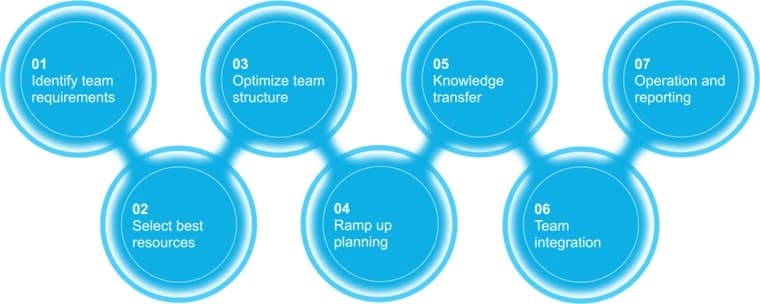Security experts as a service and Virtual CISO
FAQ
A vCISO (virtual Chief Information Security Officer) is a contracted or outsourced individual or team that provides cybersecurity leadership and guidance to an organization.
Key responsibilities of a vCISO:
- Strategic advising:
- Guides organization's leadership on cybersecurity matters
- Aligns information security program with business objectives and risk appetite
- Security program management:
- Develops and implements information security programs
- Oversees implementation of security policies and procedures
- Risk management:
- Assesses and manages security risks
- Provides guidance on compliance with regulations and industry standards
Benefits of the vCISO model:
- Access to CISO-level expertise without full-time employment costs
- Particularly beneficial for small and medium-sized businesses
- Provides strong cybersecurity leadership on a flexible basis
vCISO services typically include:
- Cybersecurity Strategy Development:
- Align security strategy with business objectives
- Assess risk posture
- Risk Assessment and Management:
- Identify vulnerabilities and threats
- Recommend risk mitigation strategies
- Security Program Development:
- Develop security policies and procedures
- Create incident response and disaster recovery plans
- Implement security awareness training
- Compliance and Regulatory Assistance:
- Guide compliance with regulations (e.g., HIPAA, PCI DSS, GDPR)
- Security Incident Response:
- Provide guidance during security breaches
- Assist with incident response planning and investigation
- Vendor and Third-Party Risk Management:
- Assess and manage risks associated with third-party providers
Advantages of using a vCISO:
- Cost-Effective:
- Pay only for needed services
- Avoid employee benefits and overhead costs
- Flexibility:
- Scale cybersecurity resources as needed
- Utilize part-time or project-based services
- Specialized Expertise:
- Access to a wide range of cybersecurity expertise
- Benefit from experience across multiple organizations
- Objectivity:
- Receive unbiased perspectives on cybersecurity programs
- Avoid influence from internal politics
- Faster Results:
- Quickly identify areas for improvement
- Implement recommendations efficiently
- Reduced Recruiting Burden:
- Immediate access to cybersecurity expertise
- Avoid time-consuming and expensive recruitment processes
vCISO as a service is a subscription or retainer-based model providing virtual Chief Information Security Officer services. Key features:
- Remote cybersecurity consulting and advisory services
- Offered by third-party providers with experienced professionals
- Services range from strategy development to incident response
- Flexible engagement options (subscription or retainer)
- Suitable for organizations without resources for a full-time CISO
Cost factors:
- Scope and complexity of cybersecurity needs
- vCISO's experience and expertise
- Duration of engagement
Pricing models:
- Flat monthly/annual fee
- Customized project-based pricing
Cost range:
- Few thousand to tens of thousands of dollars per month
Considerations:
- Compare cost to potential benefits and risks
- Evaluate against full-time CISO costs
- Choose reputable providers for best value
Key responsibilities:
- Cybersecurity Strategy Development:
- Align strategy with business objectives and risk posture
- Risk Assessment and Management:
- Identify, assess, and mitigate cybersecurity risks
- Security Program Development:
- Create policies, procedures, and response plans
- Compliance and Regulatory Assistance:
- Guide compliance with industry standards (e.g., HIPAA, PCI DSS, GDPR)
- Security Incident Response:
- Provide guidance during breaches and incidents
- Vendor and Third-Party Risk Management:
- Assess and manage risks from external partners
- Cybersecurity Awareness and Training:
- Develop programs to educate employees on cybersecurity risks
Typical responsibilities of a Virtual Chief Information Security Officer (vCISO) include:
- Cybersecurity Strategy:
- Develop and implement comprehensive strategies aligned with business objectives
- Risk Assessment and Management:
- Identify, assess, and mitigate cybersecurity risks
- Security Program Development:
- Create policies, procedures, and response plans
- Compliance and Regulatory Assistance:
- Guide compliance with industry standards (e.g., HIPAA, PCI DSS, GDPR)
- Security Incident Response:
- Provide guidance during breaches and incidents
- Vendor and Third-Party Risk Management:
- Assess and manage risks from external partners
- Cybersecurity Awareness and Training:
- Develop programs to educate employees
- Security Operations Management:
- Oversee day-to-day cybersecurity operations
- Security Architecture and Engineering:
- Design and implement secure technology solutions
vCISOs are gaining popularity due to:
- Cost-Effectiveness:
- More affordable than full-time CISOs, especially for small to medium-sized businesses
- Access to expertise on an as-needed basis
- Flexibility:
- Remote or virtual services, accessible regardless of geographic location
- Scalability:
- Ability to adjust cybersecurity support based on changing business needs
- Expertise:
- Extensive experience across various industries and organizations
- Brings diverse knowledge to strategy development and implementation
- Availability:
- Addresses the challenge of finding and hiring cybersecurity talent
- Provides access to a pool of ready-to-help experts

